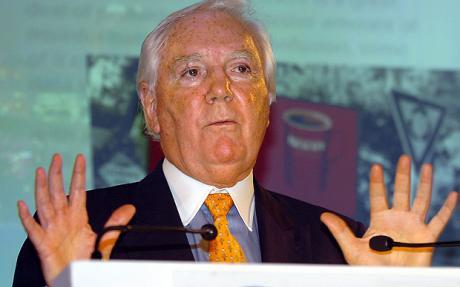Should corporate oligarchies set the agenda for public debate?

Should corporate oligarchies, including RTÉ, retain such enormous power to frame the agenda for public debate? By Vincent Browne.
It hardly matters which of the two oligarchs get control of Independent News and Media, for neither should be allowed to. Not because of any moral turpitude on the part of the oligarchy represented by Denis O’Brien or that represented by the O’Reilly family.
First, Independent News and Media is far too large, and the power it gives to whoever controls it is oppressive. On this island INM owns the Irish Independent, the Sunday Independent, the Sunday World, the Evening Herald, the Irish Daily Star, the Belfast Telegraph and Sunday Life. It owns 13 local newspapers and also one of the largest newspaper and magazine distribution agencies, Newspread, plus several of the largest print works on the island. It has a strong presence on the internet with independent.ie.
Worldwide it owns over 200 newspapers, more than 130 radio stations, around 100 commercial websites, billboard locations by the hundred and it is the major press conglomerate in five countries.
In other spheres of business, such a huge presence in a market niche would be problematic, but in the media arena it is not just problematic but subversive of the public interest. However “hands off” a media owner may be, the reality is that media invariably reflect the perspectives and interests of its controllers. And in the case of the two competing oligarchs, there is reason to believe neither are “hands off”.
In the case of Denis O’Brien his personal involvement in directing the radio stations under his control is well established. The recent dismissal of Sam Smyth as presenter of a Sunday morning current affairs programme on Today FM came after Smyth, quite properly, had sought to hold O’Brien accountable concerning the controversy to do with the award of the second mobile phone licence in 1996. The station’s denial of a direct involvement by Denis O’Brien seems far-fetched.
Business associates of Tony O’Reilly threatened the John Bruton government in 1996 that if it didn’t comply with his demands concerning his interest in a television broadcasting system, he would use his media power against that government and this is precisely what happened in the following year.
But there is a further reason for being opposed to either of these oligarchs having control of a large segment of the media. Both Denis O’Brien and the O’Reilly family have extensive corporate interests here aside from their media interests and in both instances issues have arisen that demand public accountability.
In the case of Denis O’Brien, there is clearly the issue to do with money he paid to Michael Lowry around the time when Michael Lowry’s ministerial responsibilities converged with Denis O’Brien’s corporate interests; serious issues arise in that connection which demand accountability. That accountability would be significantly compromised were Denis O’Brien’s media power to be extended.
Issues arise concerning the involvement of Tony O’Reilly in Eircom, during which time the development of the country’s broadband infrastructure was impaired, while he himself made a huge financial killing. There is also the issue of money paid on behalf of a company controlled by Tony O’Reilly, Fitzwilton, to Ray Burke in June 1989 by a cheque made payable to cash – Fitzwilton has always protested the funds were intended for Fianna Fáil – when Ray Burke had ministerial responsibility for an area overlapping with Tony O’Reilly’s commercial interests. None of the newspapers under Tony O’Reilly’s control sought accountability from him on these matters, nor are they likely to do so in the future.
Denis O’Brien and Tony O’Reilly are not the only oligarchs here. There is also the RTÉ oligarchy, by far the most massive presence in the media arena in Ireland with its two television channels (not counting the digital channels), its three radio stations (again not counting the digital stations), its website which drowns out competing websites, its publishing activities, including, last year, the publication of a publicly funded election guide.
All this massively subsidised by the public to the extent of €200 million per year. The corporate reach of RTÉ makes it very difficult for competing radio stations in particular to survive. Clearly, I would be perceived as having a vested interest in this as I work for a competing television station, but I have been advancing this view for a long time and did so repeatedly on air while presenting a radio programme on RTÉ.
The media sets the agenda and is by far the most powerful agency in shaping people’s perspectives on social and political issues and otherwise. Is it okay that corporate oligarchies, including RTÉ (which incidentally simply absorbs the agenda of the other oligarchies) retain such enormous power to frame the agenda for public debate?
In Galway on Friday evening Pat Rabbitte, who is now the Minister responsible for communications, said his department was drafting new legislation on concentration of media ownership. He said: “Any excessive concentration of media ownership and control involves risks that go beyond those involved in the case of ordinary goods and services... That is why we need a specific set of tests around concentration of ownership and its potential effects on media plurality – and I repeat that I mean plurality both in terms of content and in terms of ownership”.
He might spancel Denis O’Brien but what of RTÉ?
That’s different! {jathumbnailoff}
